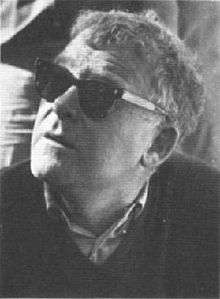Norman Tokar
| Norman Tokar | |
|---|---|
 | |
| Born |
November 25, 1919 Newark, New Jersey, United States |
| Died |
April 6, 1979 (aged 59) Hollywood, California, United States |
| Occupation | Film director |
| Years active | 1956–1979 |
| Spouse(s) |
Phyllis Coates (1955–19??; divorced) Grace Tokar (1941-1949; divorced); 1 child |
Norman Tokar (November 25, 1919 in Newark, New Jersey – April 6, 1979 in Hollywood) was a prolific director (and occasionally writer and producer) of serial television and feature films, who directed many of the early episodes of Leave it to Beaver, and found his greatest success directing over a dozen films for Walt Disney Productions, spanning the 1950s to the 1970s.[1][2]
Career
After a career as an actor on Broadway in the early 1940s, Tokar moved into radio, most notably The Aldrich Family, where he played Henry Aldrich's friend Willie at the microphone and wrote several episodes as well. Tokar then went into television direction on such sitcoms as The Bob Cummings Show and The Donna Reed Show, and the drama Naked City.
In the early 1960s, Tokar’s success working with the juvenile actors on 93 episodes of the TV sitcom Leave it to Beaver encouraged Walt Disney to hire him to direct family features for his studio, which frequently used children in key roles. His first feature film assignment was the Western Big Red (1962), followed by the Old Yeller sequel Savage Sam (1963) and Those Calloways (1965). After directing the 1966 Fred MacMurray picture Follow Me, Boys!, and the Dean Jones/Suzanne Pleshette slapstick comedy The Ugly Dachshund that same year, Tokar's next directorial assignment (Walt Disney's last before his death) was the 1967 roadshow musical The Happiest Millionaire. With a Sherman Brothers score and a cast including Fred MacMurray, Greer Garson, Tommy Steele, Lesley Ann Warren, and John Davidson, the studio hoped the film would do as well with critics and audiences as Mary Poppins had three years earlier. When it failed to do so, the studio cut the nearly three-hour film down to 144 minutes and again to 118 minutes for general release; the cut footage went unseen until it was restored in the 1990s.
Tokar followed Millionaire with more examples of the high-concept comedies that became the mainstay of the studio in the 1960s and 1970s: The Horse in the Gray Flannel Suit (1968), The Boatniks (1970), and Snowball Express (1972). After directing his only non-Disney feature in 1974, Where the Red Fern Grows, Tokar made his most commercially successful film; the 1975 comedy western The Apple Dumpling Gang. With his final film before his death, 1978's The Cat From Outer Space, Tokar obtained a co-producer credit. Between his Disney films, Tokar continued to direct TV, working on The Doris Day Show and M*A*S*H.
References
- ↑ "Norman Tokar". The New York Times.
- ↑ Ted Johnson; Sarah M. Brown (1989-09-07). "Belmont Shore Video Store a Movie Family's Affair". The Los Angeles Times.